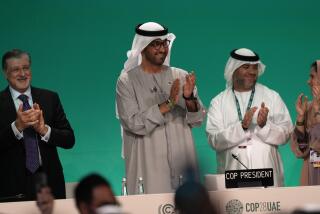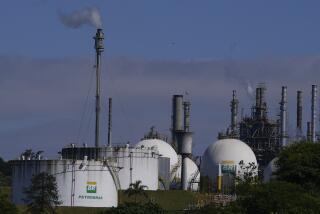Chemical Makers Back Effort on Arms
CANBERRA, Australia — In a major initiative designed to spur movement on a new international chemical weapons treaty, the world’s chemical manufacturers announced agreement Wednesday to help achieve a global ban on deadly poison and nerve gases.
The “historic pledge” from representatives of 95% of the world’s chemical producers is considered vital to achievement of a new accord because proliferation over the past decade has been linked to private industry sales often beyond the reach of government controls.
Among parties to the agreement are Iran and Iraq, two nations accused of using chemical weapons against each other during the eight-year Persian Gulf War, as well as European industries linked to Libya’s recent attempts to develop chemical weapons.
The statement is “the first time the global chemistry industry has ever made a statement on anything,” said Tom Reynolds, Australia’s chief industry delegate.
The agreement is being heralded as a milestone because the world’s major chemical producers previously had been divided on proposed inspections that would require unprecedented intrusion into private industry. A key issue at the Geneva disarmament conference has been confidentiality of industrial secrets.
The resolution, issued at an international conference here bringing chemical manufacturers together with 70 governments for the first time, expresses “unequivocal abhorrence of chemical warfare.”
It calls for resolution of differences in a treaty that includes “destruction of all existing stockpiles of and production facilities for chemical weapons.”
“The seven points in the statement go a long way not only to address the concerns of the spread of chemical weapons, but they also place the manufacturers of civilian commercial chemicals behind an early conclusion to the treaty,” according to Kyle Olson, spokesman for the U.S. Chemical Manufacturers Assn., which represents 175 American companies. Although Libya and Syria, both nations suspected of having or developing chemical weapons, boycotted the Canberra conference, they are largely dependent on the purchase of precursors needed to assemble the deadly poisons from foreign producers.
The announcement culminates months of behind-the-scenes negotiations among U.S., European, Japanese and Australian industries. The final sticking point was winning agreement from Third World nations, which have been concerned that a ban would inhibit economic development, according to sources at the conference.
More to Read
Sign up for Essential California
The most important California stories and recommendations in your inbox every morning.
You may occasionally receive promotional content from the Los Angeles Times.










